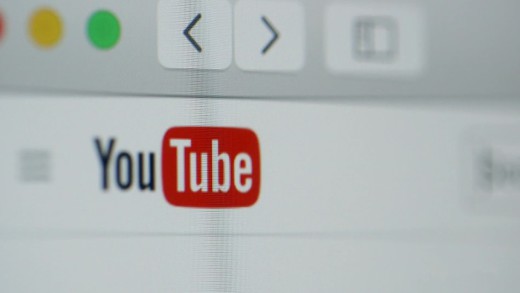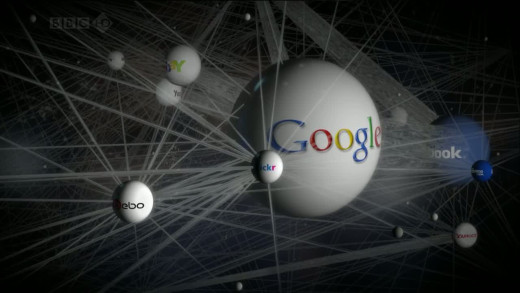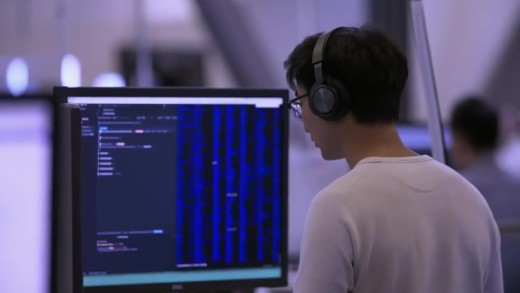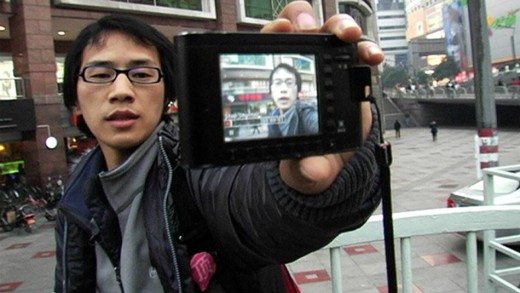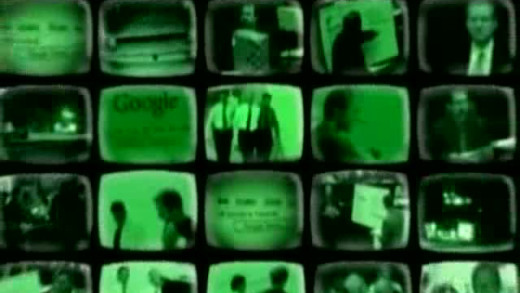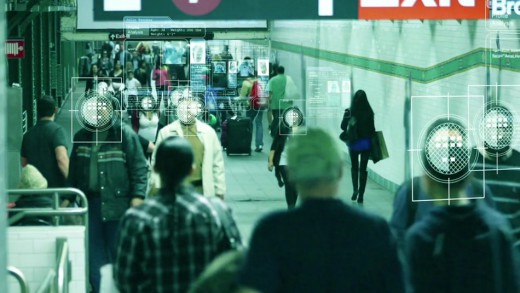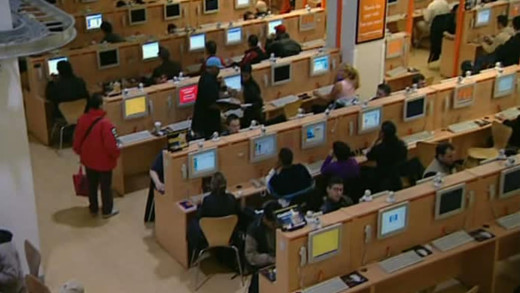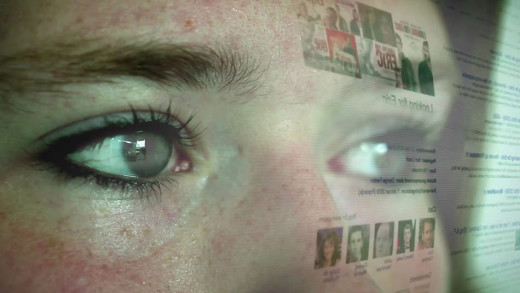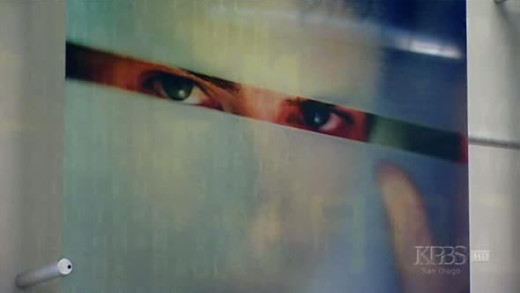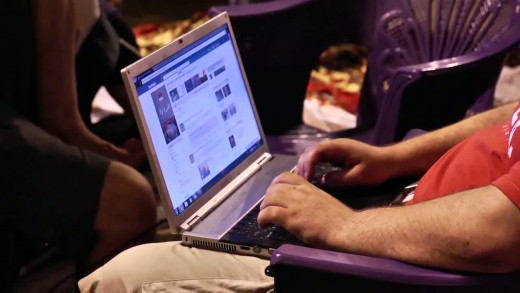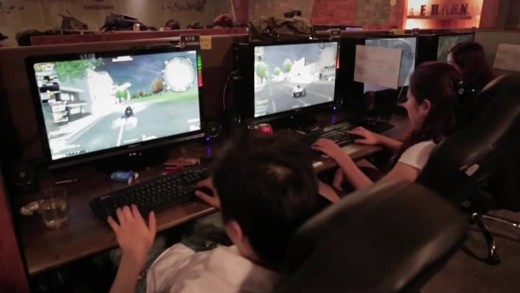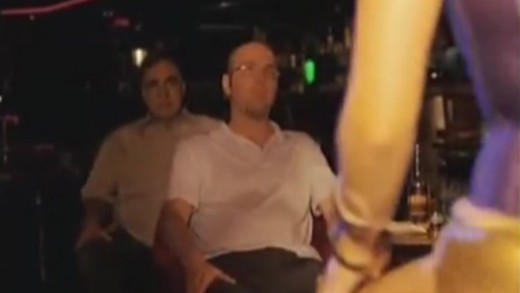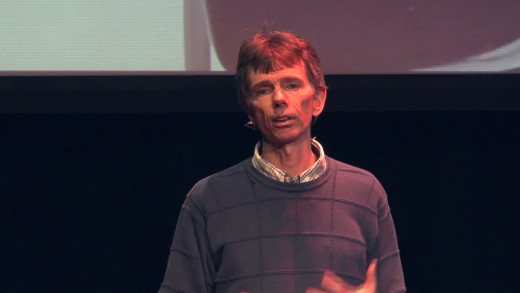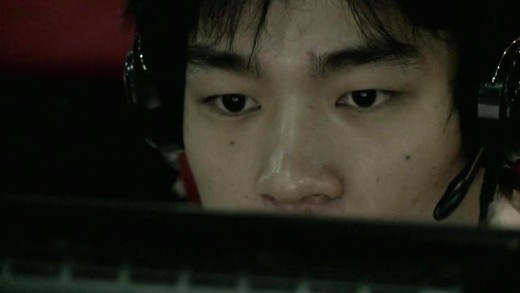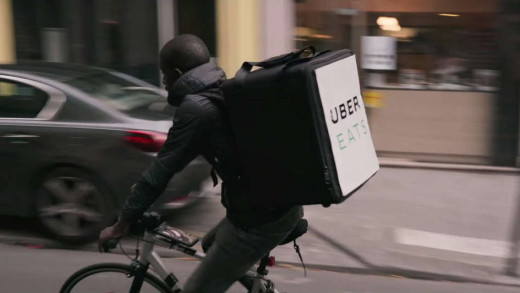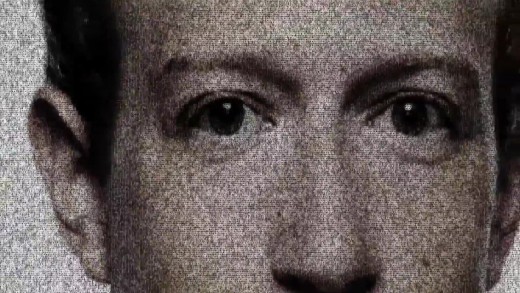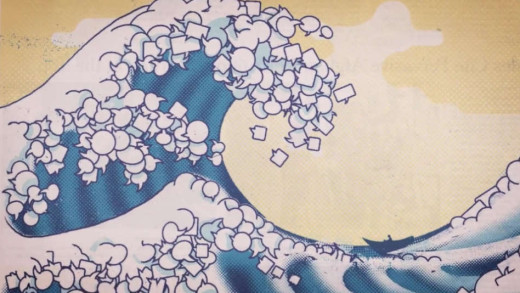This short video explores how the online world has overwhelmingly become the popular outlet for public rage by briefly illustrating some of the many stories of everyday people which have suddenly become public enemy number one under the most misunderstood of circumstances and trivial narratives. With the web acting like a giant echo-chamber, amplifying false stories and feeding on the pent-up aggression of the audience watching the spectacle, The Outrage Machine shows how these systems froth the mob mentality into a hideous mess, as a good example of where the spectacle goes and how its intensity has to keep ratcheting up in order maintain the audience attention, in a culture of dwindling attention spans, distraction and triviality.
20 years on from the invention of the World Wide Web, The Virtual Revolution explores how the Internet is reshaping almost every aspect of our lives. But what is really going on behind this reshaping? The inventor of the Web, Tim Berners-Lee, believed his invention would remain an open frontier that nobody could own, and that it would take power from the few and give it to the many. So how do these utopian claims stand up to today?
The Facebook Dilemma aims to open an in-depth investigation into the impact Facebook has had on privacy and democracy in the United States and throughout the world, by revealing how the decisions made by the company as it sought increased wealth and new users, transformed it into a vast surveillance machine, a media company, and a 'hidden hand' in elections and political discourse. Drawing on original interviews from those inside the company, this two part series catalogues some of the ignored warning signs, both inside and outside the company, of Facebook's negative impact, growing from Zuckerberg's dorm-room project and into a powerful global empire.
High Tech, Low Life follows the journey of two Chinese bloggers who travel their country chronicling undner-reported news and social issues stories. Using laptops, mobile phones, and digital cameras, both develop skills for reporting while learning to navigate China's continually evolving censorship regime and the risks of political persecution. The film follows 57-year-old 'Tiger Temple,' who earns the title of China's first "citizen reporter" after he impulsively documents an unfolding murder; and 27-year-old 'Zola' who recognises the opportunity to be famous by reporting on sensitive news throughout China. From the perspective of vastly different generations, both personalities must reconcile an evolving sense of individualism, social responsibility and personal sacrifice. The juxtaposition of Zola's coming-of-age journey from veggie-farmer to Internet celebrity; and Tiger Temple's commitment to understanding China's tumultuous past, both provide a portrait of China and of the wider questions facing news-reporting in the age of the Internet.
The Social Dilemma brings together former product directors and designers of Facebook, Google, Instagram, Pintrest, Twitter, and so on, to reflect on their creations and face questions about the age of addiction, information manipulation, and algorithmic social control they've ushered in. The creators speak openly about how they themselves took part in this co-optation of society, either naively or with malignant indifference, by designing websites in such a way to influence and manipulate billions of people for corporate interests by using deep psychological and addictive triggers in the human mind. Detailed explanations about how this can play out in the real world are illustrated through dramatisations, which are also expanded upon by experts in psychology, technology, and social studies. The result is a sobering call for emergency damage control, to undo the massive harm that technology companies have unleashed on society unrestrained for the past several decades, at a time of rapid social unravelling.
Every day, escalating technologies are being used to monitor all of us as populations with unprecedented scrutiny—from driving habits to workplace surveillance, as shoppers, as consumers, as citizens. We are all increasingly being observed and analysed. Internet searches are monitored and used as evidence in court, the police track our movements on the road, governments collect our DNA, fingerprints and iris scans, corporations assemble huge databases for profiling and selling data, while governments collude with such lucrative businesses—for example, Acxiom, Lexis Nexis and ChoicePoint—to gain access to vast volumes of information about people and the machinations of modern society. What will it take for us to stop this system before it boils over into a full-blown technocratic authoritarian regime?
The Hacker Wars explores the strange duality of the modern-day computer-hacker as a mischievous provocateur, but also in some cases, societal activists with underlying political fervour, serious or not. The film explores this by profiling some of the renowned characters that have tickled the secretive inner workings of corporations and government agencies for various reasons—ranging from the nefarious and narcissistic, to the political and scandalous. Some do it for the lulz, others do it to prove a point, and others do it to "speak truth to power." In any event, many have faced severe punishments as a result. By following through this, The Hacker Wars touches on issues of whistleblowing, social justice, and power relations, in a time where computer technologies represent extreme power and control. But for whom? And what? This poses the question in deciphering the personalities of the hackers themselves. Are they serious activists with good intentions, or are they driven by insane ideologies?
The Net explores the back-story of Ted Kaczynski (the infamous 'Unabomber') as a prism to the often unexamined side of the history of the Internet. The film combines travelogue and investigative journalism to trace contrasting counter-cultural responses to the so-called 'cybernetic' revolution of the 1970s. For some whom resist the pervasive systems of digital technology, the Unabomber can come to symbolise an ultimate figure of refusal. But for those that embrace the technologies, as did and do the champions of so-called 'media art', such as Marshall McLuhan, Nam June Paik and Stewart Brand, the promises of worldwide networking and instantaneous communication outweigh any and all of the concerns. The Net links these multiple nodes of cultural and political history, analogous to the Internet itself. Circling through themes of utopianism, anarchism, terrorism, the CIA, LSD, MKULTRA, Timothy Leary, Ken Kesey and the Merry Pranksters, The Net exposes the conspiracies and upheavals, secrets and cover-ups as part of the forgotten subversive history of the Internet.
Tracing the Internet's history as a publicly-funded government project in the 1960s, to its full-scale commercialisation today, Digital Disconnect shows how the Internet's so-called "democratising potential" has been radically compromised by the logic of capitalism, and the unaccountable power of a handful of telecom and tech monopolies. Based on the acclaimed book by media scholar Robert McChesney, the film examines the ongoing attack on the concept of net neutrality by telecom monopolies such as Comcast and Verizon, explores how internet giants like Facebook and Google have amassed huge profits by surreptitiously collecting our personal data and selling it to advertisers, and shows how these monopolies have routinely colluded with the national security state to advance covert mass surveillance programs. We also see how the rise of social media as a leading information source is working to isolate people into ideological information bubbles and elevate propaganda at the expense of real journalism. But while most debates about the Internet focus on issues like the personal impact of Internet-addiction or the rampant data-mining practices of companies like Facebook, Digital Disconnect digs deeper to show how capitalism itself turns the Internet against democracy. The result is an indispensable resource for helping viewers make sense of a technological revolution that has radically transformed virtually aspect of human communication.
Social media networks purport the ability to interact with culture—talking directly to artists, celebrities, movies, brands, and even one another—in ways never before possible. But is this real empowerment? Or do marketing companies still hold the upper hand, as before? Generation Like explores how the perennial quest for identity and connection is usurped in the pervasive game of cat-and-mouse by vast corporate power in the extensive machine for consumerism that is now the online environment. The audience becomes the marketer; buzz is subtly controlled and manipulated by and from real-time behavioural insights; and the content generated is sold back to the audience in the name of participation. But does the audience even think they're being used? Do they care? Or does the perceived chance to be the 'next big star' make it all worth it?
Physician and mother of two Dr. Delaney Ruston became interested in how much screen time is too much when her preteen started begging for a smartphone. Ruston saw other parents equally confused on how to balance technology with a young developing mind, so she decided to delve into the science behind screen time to understand how it affects young people's minds and development. Through personal stories and input from leading researchers, the result is Screenagers, a film that sheds light on the impact screen time is having on kids; exploring how learning, playing, and socialising online effects teens' developing attention span, fragile self-esteem, and moral instincts. Screenagers examines the real risks of failing in school, social isolation, and digital addiction. It also explores solutions to handle screen time and provides parents with tools to help young people develop self-control and find balance in their digital lives, rather than rapid-fire thumbs and a six-second attention span.
September 11 has indelibly altered the world in ways that people are now starting to earnestly question: not only perpetual orange alerts, barricades and body frisks at the airport, but greater government scrutiny of people's records and electronic surveillance of their communications. The US National Security Agency (NSA) has engaged in wiretapping and the sifting of Internet communications of millions of people worldwide, including their own...
HyperNormalisation wades through the culmination of forces that have driven this culture into mass uncertainty, confusion, spectacle and simulation. Where events keep happening that seem crazy, inexplicable and out of control—from Donald Trump to Brexit, to the War in Syria, mass immigration, extreme disparity in wealth, and increasing bomb attacks in the West—this film shows a basis to not only why these chaotic events are happening, but also why we, as well as those in power, may not understand them. We have retreated into a simplified, and often completely fake version of the world. And because it is reflected all around us, ubiquitous, we accept it as normal. This epic narrative of how we got here spans over 40 years, with an extraordinary cast of characters—the Assad dynasty, Donald Trump, Henry Kissinger, Patti Smith, early performance artists in New York, President Putin, Japanese gangsters, suicide bombers, Colonel Gaddafi and the Internet. HyperNormalisation weaves these historical narratives back together to show how today's fake and hollow world was created and is sustained. This shows that a new kind of resistance must be imagined and actioned, as well as an unprecedented reawakening in a time where it matters like never before.
Centred around the concept of open computer networks that contradictorily end up running closed corporate-controlled communication portals like Facebook and Twitter, Free The Network follows two young men who camp out at Zuccotti Park building wireless access points to connect their devices as part of the 'Occupy movement.' Through interviews along the way, Free The Network examines the current state of the Internet in the midst of the protest, and shows how the myth of the 'democratisation of technology,' along with the widespread emergence of clicktivism, is a flawed framework for driving social and political change...
A Good American chronicles the work of whistleblower William Binney, a former official of the National Security Agency who specialised in cryptography and signals intelligence analysis for over three decades. The film focuses on the lead up to the events of the 1990s where Binney was instrumental in the creation of a secret intelligence program called ThinThread, in which mass surveillance of global communications data was carried out and had sophisticated analysis applied to it in search for threats in real time. However, three weeks prior to the September 11th 2001 attacks, Michael Hayden, director of the NSA, ends the ThinThread program to instead run with another called Trailblazer which lacks privacy protections. Not long after this, Binney resigns. What the NSA does to Binney after this turn of events is the story of the transformation where Binney and his colleagues Kirk Wiebe, Ed Loomis, Thomas Drake, and Diane Roark blow the whistle on a corrupt and brutal agency.
In 2010, the death of a three-month-old baby in South Korea named Sarang (translated as Love) became an international news story—the parents had neglected her to play an online fantasy game. She died primarily of malnutrition. But instead of merely condemning the parents, Love Child takes a different approach by looking at some issues that led to the parents addiction and how their child became oblivious to them. The film then expands to view the way South Korea's standing as a world leader in Internet technologies has adversely affected its society, speaking also globally, where the virtual world now trumps the real world for many millions of people, with extreme consequences.
United States of Conspiracy investigates the alliance of far-right radio show host and conspiracy theorist Alex Jones, Donald Trump, and long-time Trump associate Roger Stone, and their roles in deepening the battle over truth and lies in an age of disinformation. Drawing on interviews with Stone, former staffers from Jones' InfoWars website, people who have been directly affected by their conspiracy theories, and experts in how misinformation spreads, we see how once-fringe conspiracy theories have come to be wielded as a pervasive tool at the highest levels of mainstream politics.
Presenting accounts from prominent players such as The Pirate Bay, Piratbyrn, and the Pirate Party in the Swedish piracy culture, Steal This Film documents the movement against intellectual property. In particular, the film provides critical analysis of the alleged regulatory capture attempt performed by the Hollywood film lobby to leverage economic sanctions by the United States government on Sweden through the WTO...
American Call-Girl is an undercover investigation into the escort industry in Las Vegas, where prostitution is illegal on paper but alive and well in practice, with the industry making use of clever ways for the John to "read between the lines" while everyone else turns a blind eye. With the Internet the backbone of the 21st century sex industry, thousands of escort websites are carefully worded, but if you look closely, many appear to clearly sell sex in a fiercely competitive 'market.' American Call-Girl goes behind the scenes to meet escorts and see what life is really like for them. What is exposed along the way, is the rampant and abusive underworld where supposedly independent girls are actually made beholden to pimps by way of violence, extortion and trafficking. Others fight for the freedom to simply work, being on top of their own marketing and advertising. The escort industry thrives in cities throughout the United States, but Las Vegas is a ground zero, a thriving black market.
The Great Porn Experiment asks the question: What is the hyperstimulation of today's Internet enticements doing to our brains?
Filmmaker Werner Boote travels across the globe to investigate the era of so-called Big Data, where huge amounts of detail about our lives are gleaned for use in decision making, automation, and consumerism, but ultimately, to generate huge profits for corporations that harvest and control our data. Everything's Under Control investigates these modern times through many lenses: People who have studied surveillance culture, to democracy activists in Hong Kong; from educators, advertisers, and traders, to privacy advocates, and security experts; from digital IDs, fingerprinting, iris scans and online profiling, to hacking, data leaks, and invigorating recent historical memory of atrocities based on data and personal information. We hear distorted perspectives on privacy from many voices, challenging the viewer to reflect on what it means to live through the largest social experiment with data ever before conducted on a global scale.
Web Junkie travels to China, the first country in the world where Internet addiction has been classified as a clinical disorder. The film focuses on the methods used to treat young people, which reveal a surreal mix of prison, hospital, and military operations, with a dose of group therapy thrown in for good measure. We also see the cultural and emotional effects of Internet addiction in China's society of hyper-competitiveness, which speaks to the dominant culture worldwide. Web Junkie exposes the virtual world in a country—and indeed world—of disparity, where health officials have no idea how to cope with a younger generation that finds World of Warcraft more exciting and supposedly more "real" than their own lives.
Millions of people around the world are finding work by-the-job online. The "gig economy" is worth more than $5 trillion worldwide, and seemingly growing. But who are these workers? Seduced by the promise of independence, and control over their working hours and income, people around the world that are lured into the gig economy now face the harsh reality of it algorithmically-driven market place: dangerous working conditions, instability, and the precariousness of their work that can stop overnight in the case of deactivation or a bad review. Through committed characters, The Gig is Up shows that the so-called 'freedom' that is espoused by this technological economy is only an illusion.
Nerds 2.0.1: A Brief History of the Internet is a documentary series written and hosted by Mark Stephens under the pseudonym Robert X. Cringely as a sequel to Triumph of the Nerds. The series follows on by documenting the development of ARPANET, the Internet, the World Wide Web and the resulting dot-com bubble of the mid and late 1990s...
Facebook is an enormously powerful corporation, harnessing both the self-disclosed and gleaned personal data of over 2 billion people. Its user-base is larger than the population of any country. The company is all pervasive online, tracking and profiling users and non-users alike. Cracking the Code looks at the insides of this giant machine and how Facebook turns your thoughts and behaviours into profits--whether you like it or not. And it's not just a one-way transaction either. Cracking the Code also explains how Facebook uses vast troves of web data to manipulate the way you think and feel, as well as act--all in the sole interests of Facebook, masquerading as "community." What are the social implications of this--when one company basically controls the insights and experiences of the entire online world, with extremely personalised and targeted social and behavioural engineering on a scale never before seen?
Once relegated to the margins of society, pornography is now the most pervasive and visible aspect of popular culture, assuming an unprecedented role in media as its content becomes more harsh and extreme, racist and abusive. This eye-opening and disturbing film moves beyond frivolous "liberal versus conservative" debate and tackles the real issues surrounding pornography by placing the voices of performers themselves, producers and critics directly alongside the observations of women and men as they candidly discuss the role porn has played in shaping their sexual imaginations and relationships. The Price Of Pleasure reveals a nuanced portrait of how pleasure and pain, commerce and power, freedom and responsibility have become extremely twisted by popular culture, usurping the most intimate area of our lives.
With the Internet surpassing print as the main news source, and newspapers going bankrupt, Page One chronicles the mainstream-media industry's transformation, while commenting on what it views as the high stakes for democracy and informedness as told from inside the newsroom at The New York Times. For a year, this film follows journalists at the paper's Media Desk, a department created to cover the transformation of the media industry. Through this prism-within-a-prism, a complex view emerges of a media landscape fraught with both decline and opportunity, as writers like David Carr track print journalism's metamorphosis even as their own paper struggles to stay vital and solvent, publishing material from WikiLeaks and encouraging writers to connect more directly with their audience. Meanwhile, rigorous journalism is still alive, but is facing perhaps the most tumultuous time in generations.
One generation from now, most people in the United States will have spent more time in the virtual world than in the natural world. New media technologies have changed lives in countless ways. Streams of information now appears in a click. Overseas friends are contactable in an instant. Engulfing video games and streams of endless entertainment to stimulate the senses, dazzle the mind and pander to the acculturated desire to be in control. Even grandma loves Wii. But what are people missing when they're behind screens? How is it already impacting our children, our society, and the planet? At a time when people are at screens more than they are outside, Play Again explores the challenge in dealing with the addiction and returning to the real world...
